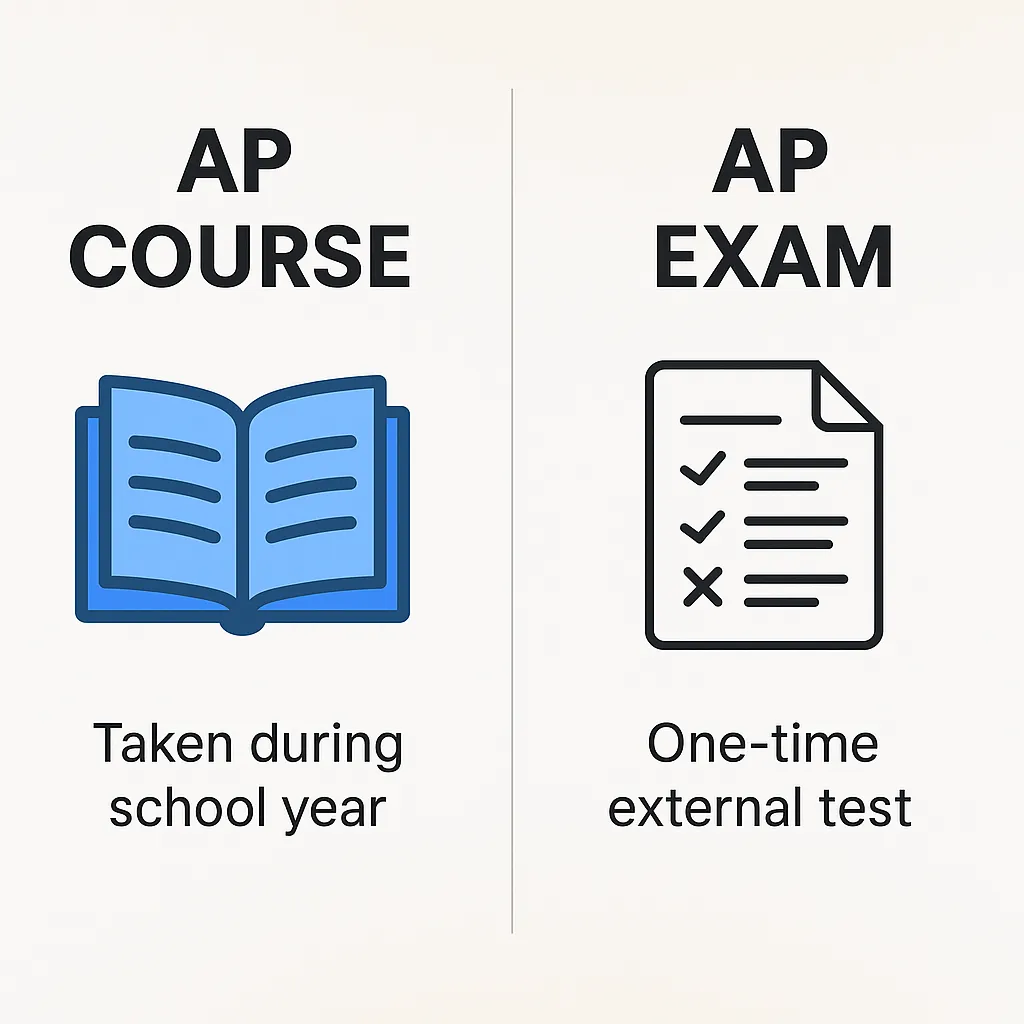Do AP exam scores actually affect your high school GPA? Or is it just the AP class that makes a difference? If you’re confused — you’re not alone.
Many students assume that scoring low on an AP exam (like a 1 or 2) might drag down their GPA. But here’s the truth: your AP exam score and your GPA are not the same thing — and they don’t always affect each other the way you think.
In this guide, we’ll break down:
- How AP exam scores affect high school GPA (and when they don’t)
- Whether AP classes help or hurt your GPA
- The real impact of AP scores vs GPA on college applications
- And a surprising answer to: does failing an AP exam lower your GPA?
We’ll also clear up the confusion between weighted vs unweighted GPA — and show how AP classes can actually give your GPA a boost, even if your exam score isn’t perfect.
Let’s make sense of it all
Worried your score wasn’t high enough? Learn what happens if you fail and what steps you can take next.
Want a clearer GPA breakdown with examples? Jump to our visual GPA guide below.
Do AP Exam Scores Affect Your GPA?
Short answer: No. Your AP exam score does NOT affect your GPA.
Your GPA (Grade Point Average) is based on the grades you earn in your classes, not your AP test results. So even if you score a 1 or 2 on the AP exam, it won’t lower your GPA. Likewise, scoring a perfect 5 won’t raise it either.
Here’s how it works:
| 📘 What Affects GPA | ❌ What Doesn’t Affect GPA |
|---|---|
| Your final AP class grade | Your AP exam score (1–5) |
| Weighted vs unweighted scale | Whether you pass or fail the AP exam |
| How many AP classes you take | When or how you take the AP exam |
Example: If you get an A in AP Biology but score a 2 on the AP exam, you’ll still get the GPA boost from the A — your exam score doesn’t cancel that out.
See when the 2026 AP exams are happening so you can prepare for those final scores that impact your weighted GPA.
Let me know if you’d like a follow-up box (like “Quick Recap” or “Studen
Let’s Clear This Up with a Real Example
Let’s say you’re taking AP Biology:
- You earn a B+ in the class, which gets factored into your GPA—often as a weighted grade (more on that soon).
- You then take the AP Biology exam in May and score a 5—great job! That score can help you earn college credit, but it won’t change your high school GPA.
Don’t waste the weeks after AP testing — use this after-AP exam checklist to stay productive.
AP Scores vs GPA Impact Explained

There’s a lot of confusion between AP exam scores and GPA, so let’s break it down clearly.
Think of it like this:
- Your GPA is based on how well you perform in the AP class throughout the school year.
- Your AP score (1 to 5) comes from the AP exam you take in May, not your class performance.
- The exam score doesn’t change your GPA, even if it’s a 5 or a 1.
Quick Comparison Table
| AP Exam Score | Course Grade (GPA) | College Credit? | Impact on GPA |
|---|---|---|---|
| 1–2 | A (in class) | ❌ No | ✅ No GPA impact |
| 3 | A | 🤷 Maybe | ✅ No GPA impact |
| 4–5 | A | ✅ Yes | ✅ GPA boost (via weighted class) |
What’s the real takeaway?
✅ Your AP class grade affects your GPA — not your AP exam score.
✅ AP courses are usually weighted, so a high grade in one can give your GPA a small boost.
❌ Low AP exam scores don’t lower your GPA.
🎓 Colleges may award credit or placement based on AP exam scores, but only if you choose to send them.
Does Failing an AP Exam Lower Your GPA?
Short answer: No, failing the AP exam does not lower your GPA — as long as you pass the course.
Your GPA is based on the grade you earn in the AP class itself, not your score on the AP exam. So even if you get a 1 or 2 on the test, your GPA won’t drop if you still earn a B or an A in the course.
Wondering what happens if you don’t pass? Here’s a full guide on how low scores impact GPA and what it really means for your transcript.
A Note on Academic Pressure:
Many students feel intense stress around AP exams — like their whole future depends on that one score. But the truth is, colleges care more about your course grades and GPA than your AP test scores (unless you’re trying to earn college credit).
If you’re struggling with burnout or pressure to succeed, talk to a counselor or trusted teacher. One exam won’t define you.
Different schools use different weighting systems. You can check your school district’s policy or refer to this College Board AP policy guide.
Related reading:
👉 Improve Your GPA Giude.
✍️ What’s the Difference Between an AP Course and an AP Exam?
This is where many students get confused. Think of it like this:
| AP Course | AP Exam |
|---|---|
| The class you take throughout the school year | A separate test you take in May |
| Affects your high school GPA | Does NOT affect your GPA |
| Graded by your teacher (A–F) | Scored by the College Board (1–5) |
So when comparing AP course vs AP exam, remember: the classroom grade counts toward your GPA, while the exam score is used for college credit or placement decisions.
✅ Key point: You can take the AP course without taking the exam, and vice versa (if allowed by your school). But taking both is recommended if you’re aiming for college credit.
Will My AP Exam Score Affect My College GPA?
Short answer: No, it won’t.
If you’re wondering, “Will my AP exam score affect my college GPA?” — here’s the truth:
Your college GPA starts fresh the moment you begin classes. It only includes the grades you earn in your actual college courses.
AP exam scores don’t count toward your college GPA at all.
So what do AP scores do in college?
✅ Placement – A high score (usually a 4 or 5) might let you skip intro-level classes.
✅ Credit – Some colleges award credits, saving you time and money.
🚫 No GPA boost or harm – Whether you scored a 1 or a 5, it won’t raise or lower your GPA in college.
Example:
If you score a 5 on AP Biology, you might get to skip Bio 101. But once you start Bio 201 in college, that grade goes into your GPA — your AP score never does.
Key takeaway: AP exam scores help with placement and credit, but they have zero effect on your college GPA.
AP Exam Scoring: What Do the Numbers Mean?
The AP exam is scored on a scale from 1 to 5, with 5 being the highest:
- 5 – Extremely well qualified (often earns college credit)
- 4 – Well qualified
- 3 – Qualified (may earn credit at some schools)
- 2 – Possibly qualified
- 1 – No recommendation
Most colleges accept scores of 3 or higher for credit or advanced placement, but policies vary. Always check with your target schools.
Want to see how your AP score will impact your GPA? Try our AP Score GPA Estimator to get a quick, personalized estimate based on your test results.
Related guide:
Weighted vs. Unweighted GPA: Full Breakdown
Do AP Exams Affect GPA?
No, AP exams do not affect your GPA—only your AP course grade does.
This is a common source of confusion for students and parents alike.
While the AP exam can lead to college credit, it does not influence your high school GPA. Your school calculates GPA based on grades earned during the course, not on your performance on the College Board’s final exam.
Example: A student might earn an A in AP Chemistry due to consistent classwork and strong test performance, but score a 2 on the AP exam. That A still boosts their GPA—possibly even more if it’s weighted—but the low AP score won’t pull it down.
Conversely, another student might struggle in AP U.S. History and finish with a C+, yet ace the AP exam with a 5. That 5 may help them earn credit at some colleges, but it won’t raise their high school GPA.
Do AP Classes Help Your GPA or Hurt It?
Short answer: AP classes can help your GPA — but only if your school uses a weighted GPA system. Still, they can hurt your GPA if you’re overwhelmed and your grades drop.
Let’s break this down:
How Weighted GPA Systems Work
In many high schools, GPA is calculated on a weighted scale to reward the difficulty of advanced courses like AP classes.
- Regular classes: A = 4.0, B = 3.0, etc.
- AP classes: A = 5.0, B = 4.0, etc.
That means if you get a B in an AP class (4.0), it’s the same GPA boost as an A in a regular class. This is why AP classes often help your GPA — even if you don’t ace them.
How AP Classes Can Boost GPA
If you’re getting mostly A’s and B’s in your AP courses, you’ll likely see a higher weighted GPA than if you took only regular or honors classes.
That boost can help:
- Improve class rank
- Qualify for honors like valedictorian or top 10%
- Impress colleges that look at rigor + GPA
When AP Classes Might Hurt Your GPA
Now, here’s the flip side.
If you’re taking too many AP classes and your grades slip (think C’s or below), your unweighted GPA could take a hit. Colleges may notice if you’ve overloaded and underperformed — especially if your school doesn’t offer weighted GPA.
Also, AP classes can cause:
- Stress and burnout
- Lower performance in other subjects
- A dip in unweighted GPA, which some colleges still consider
So, Do AP Classes Help or Hurt Your GPA?
It depends on your school’s grading system and how well you manage the workload.
For college admissions: The challenge of AP coursework can help you stand out — even if your GPA isn’t perfect.
On a weighted scale: AP classes usually help your GPA.
On an unweighted scale: They can hurt it if your grades drop.
👉 For a deeper breakdown of how GPA works—including what affects it and how it’s calculated—check out our complete GPA guide.
Helpful guide to explore next:
Will My AP Exam Score Affect My College GPA?
Short answer: No, it won’t.
If you’re wondering, “Will my AP exam score affect my college GPA?” — here’s the truth:
Your college GPA starts fresh the moment you begin classes. It only includes the grades you earn in your actual college courses.
AP exam scores don’t count toward your college GPA at all.
So what do AP scores do in college?
✅ Placement – A high score (usually a 4 or 5) might let you skip intro-level classes.
✅ Credit – Some colleges award credits, saving you time and money.
🚫 No GPA boost or harm – Whether you scored a 1 or a 5, it won’t raise or lower your GPA in college.
Example:
If you score a 5 on AP Biology, you might get to skip Bio 101. But once you start Bio 201 in college, that grade goes into your GPA — your AP score never does.
Key takeaway: AP exam scores help with placement and credit, but they have zero effect on your college GPA.
AP Scores vs High School & College GPA
| What It Affects | AP Score Impact |
|---|---|
| High School GPA | ✅ Indirectly affects it if AP course is weighted |
| College Admissions | ✅ Supports academic rigor and preparedness |
| College Placement | ✅ Can help skip intro courses |
| College Credit | ✅ May earn credit, depending on college |
| College GPA | ❌ No impact at all — your GPA resets |
Reminder: College GPA only includes grades from college courses, not AP scores.
If you’re not satisfied with your score, can retaking improve GPA? Yes—under certain conditions. Learn when it’s worth it and how to approach a retake strategically.
Common AP Exam Challenges & Solutions
Many students struggle with AP exams due to their rigorous nature. Here are common challenges and how to overcome them:
❌ Challenge: Difficulty understanding complex concepts.
✅ Solution: Use structured study guides like Princeton Review’s AP Study Guide for detailed explanations and practice questions.
❌ Challenge: Struggling with time management.
✅ Solution: Follow a dedicated AP study schedule, allocating time for each subject. Consider professional tutors from Kaplan or Wyzant.
❌ Challenge: Test anxiety affecting performance
✅ Solution: Practice mindfulness techniques and simulate exam conditions to build confidence.
❌ Challenge: Low practice test scores
✅ Solution: Identify weak areas, focus on improvement, and consider professional tutoring from Kaplan or Wyzant.
❌ Challenge: Not enough AP study resources
✅ Solution: Utilize AP prep books, online courses, and free practice tests available on College Board.
If you’re preparing for AP exams on your own, check out our guide on how to self-study for AP exams and score a 5 for the best strategies and study plans.
Why AP Scores Matter for College Admissions
Many colleges consider AP exam scores as part of the admissions process. A high AP score demonstrates college readiness, strong study habits, and subject mastery. Some key benefits include:
✅ Earning College Credit: Many colleges accept AP scores of 3 or higher for course credit, helping you save money on tuition.
✅ Enhancing Your Application: A strong AP exam score strengthens your college application, especially for competitive schools.
✅ Standing Out in Competitive Fields: If you’re applying to STEM programs, high AP scores in Calculus, Physics, or Biology can set you apart.
Feeling overwhelmed as AP exams approach? Read our guide on tips to reduce AP exam stress and stay focused for proven techniques to manage anxiety and perform your best
How to Improve Your AP Exam Score
If you’re aiming for a higher score on your AP exams, consider professional tutoring and study guides:
Boost Your AP Score with Top Study Guides
- Princeton Review’s AP Study Guide – A comprehensive guide to help you ace your AP exams.
- Barron’s AP Prep Book – Includes practice tests, study strategies, and exam tips.
Get Expert Tutoring for AP Exams
- Kaplan AP Tutoring – One-on-one tutoring tailored to your learning style.
- Wyzant AP Tutors – Find experienced tutors to help you master difficult AP subjects.
Related Resources & Further Reading
🔗 AP vs Dual Enrollment – Should you take AP classes or dual enrollment? Learn the pros and cons.
🔗 Best AP Study Apps & Websites – Find the best digital resources to prepare for your AP exams.
Frequently Asked Questions About AP Scores
Q: Do AP scores affect college GPA?
No, AP scores do not affect your college GPA, but they can earn you college credit and placement.
For details on reporting AP scores to colleges, visit the College Board’s AP Score Reporting Guide
Q: Can a low AP score hurt you?
While a low AP score won’t hurt your GPA, it might impact college admissions if the school considers AP exam scores.
Q: Is a 3 on an AP exam good?
A score of 3 is considered passing, and many colleges accept it for credit, but competitive schools may require a 4 or 5.
Q: Which AP exams are the hardest?
AP Calculus BC, AP Physics C, and AP Chemistry are considered among the most challenging.
Q: Do AP Exam Scores Affect GPA?
No, AP exam scores do not directly affect your GPA. However, AP courses are often weighted higher on the GPA scale, meaning that the grades you earn in AP classes (such as an A in an AP class) will be counted as higher on your GPA compared to regular classes. The exam score itself does not impact this calculation.
Q: Is a 70% a 5 on the AP Exam?
No, a 70% on an AP exam is generally not equivalent to a 5. The AP scoring scale ranges from 1 to 5, with 5 being the highest. Typically, a score of 5 reflects exceptional performance, while a 70% might result in a score of 3 or lower, depending on the difficulty of the exam and the scoring curve.
Q: How Many Points Does AP Add to Your GPA?
AP courses are often weighted higher than standard classes, typically on a 5.0 scale instead of the usual 4.0 scale. This means that if you earn an A in an AP course, it will count as 5.0 points instead of the usual 4.0. However, this does not mean the AP exam score itself adds points to your GPA—it’s the course grade that impacts your GPA.
Q: How Much Does an AP Exam Boost Your GPA?
An AP exam does not directly boost your GPA. What matters is your AP course grade, which is weighted higher in most GPA calculations. For instance, an A in an AP class is typically treated as a 5.0 in your GPA calculation, which can significantly raise your overall GPA if you take multiple AP courses.
Q: Does the AP Exam Affect Your GPA?
No, the AP exam score itself does not affect your GPA. However, AP courses are weighted more heavily, meaning the grades you earn in these courses can boost your GPA if you perform well. The AP exam score might affect college credit or placement but not your high school GPA.
Q: Do AP Exam Scores Matter?
Yes, AP exam scores can matter, especially for college credit and placement. Many colleges offer college credit for scores of 3 or higher, which can save on tuition. Additionally, high AP scores can strengthen your college application, showing that you are academically prepared for college-level work.
Q: Do AP scores show on your high school transcript?
Usually, no. Most high schools only include your AP course name and grade on your transcript—not your AP exam score. If a college wants to see your AP scores, they’ll ask for them directly from the College Board.
Q: Does an AP exam score of 1 hurt college chances?
A: Not really. Colleges mainly focus on your overall GPA and course rigor. One low AP score (like a 1 or 2) won’t make or break your application—especially if you earned a solid grade in the class. It might look better to not report that score, depending on the college’s policy.
Q: Should I report low AP scores?
A: It depends. If you scored a 1 or 2, it’s usually better not to report it—unless a specific college requires all scores. For scores of 3 or higher, consider reporting them, especially if the college accepts them for credit.
AP Class Grades Matter More Than Exam Scores
If there’s one key takeaway, it’s this: Your AP class grade—not your AP exam score—is what affects your GPA.
That doesn’t mean the exam isn’t important. A high score can earn you college credit, impress admissions officers, and even save you money in the long run.
But when it comes to your high school GPA, your day-to-day effort in the class counts more.
Students often put pressure on themselves to score a perfect 5. While aiming high is great, remember: your GPA is built throughout the year—not on a single exam day.

✅ Student Takeaway Checklist
Use this as a quick guide when planning your AP strategy:
- ✅ Focus on AP class performance — That’s what boosts (or lowers) your GPA.
- ✅ Use weighted GPA to your advantage — Many schools give extra points for APs.
- ✅ Think of the AP exam as an opportunity, not a risk — It can open college doors, but won’t hurt your GPA.
- ✅ Send only your best scores to colleges — You’re in control of what they see.
💡 Final tip: Choose AP classes that match your strengths and interests—not just to impress colleges, but to set yourself up for success.
If you want a deeper look into how U.S. grading systems vary, you can read about it in our U.S. Public School Grading Scale post.
Check your semester targets with this final grade calculator.

Nawab, an educator teaching K-12 since 2010, holds an English honors graduate degree and a diploma in elementary education. He has also been blogging for five years, sharing insights for educators and parents.

